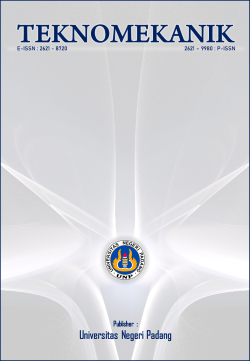Economic analysis of waste power plants based on the economic scale -Case study Merah Putih waste power plant
DOI:
https://doi.org/10.24036/jptk.v6i2.33223Keywords:
PLTS Merah Putih, Economic analysis, Waste to energy, Incineration power plantAbstract
Jakarta's dense population creates problems with the high daily waste production, which reaches 7,500 tons. On the other hand, the open dumping method in the final waste treatment creates another problem in the form of greenhouse gas emissions. The regional government also issued a policy to reduce greenhouse gas emissions to achieve net zero emission by 2050. The solution that then emerged for the two problems above was to convert waste into electrical energy through incineration technology. This study aims to conduct an economic analysis in the context of implementing incineration technology. The results showed that the minimum capacity for economic feasibility was 8 MW with an LCoE of IDR 2,578.32/kWh, 429 tonnes of waste per day, an IRR of 8.63%, and an NPV of IDR 115,038,835,638.12 at an investment value of IDR 505.877.074.317
Downloads
References
Alkishriwi, N. (2021, May). Feasibility Study of a Waste-to-Energy (WtE) Plant for Tripoli City, Libya. In 2021 IEEE 1st International Maghreb Meeting of the Conference on Sciences and Techniques of Automatic Control and Computer Engineering MI-STA (pp. 468-473).
Badan Pusat Statistik DKI Jakarta. (20/06/2023). Jumlah Penduduk Provinsi DKI Jakarta Menurut Kelompok Umur dan Jenis Kelamin.https://jakarta.bps.go.id/indicator/12/111/1/jumlah-penduduk-provinsi-dki-jakarta-menurut-kelompok-umur-dan-jenis-kelamin.html
Bangun, B. T., Purba, R., & Batih, H. (2019). Analisis Ketahanan Energi Pembangkit Listrik Tenaga Sampah (PLTSa) Metode Landfill dan Thermal di Tempat Pembuangan Sampah Terpadu (TPST) Bantar Gebang. Lektrokom: Jurnal Ilmiah Teknik Elektro, 2(1), 14-14.
Dinas Lingkungan Hidup DKI Jakarta. (2022). Inventarisasi Profil dan Pelaporan Penurunan Emisi Gas Rumah Kaca Provinsi DKI Jakarta.
Dinas Lingkungan Hidup DKI Jakarta. (2023). Pengelolaan TPST Bantargebang.
DJEBTKE-KESDM. (2021). Pedoman Investasi Pembangkit Listrik Tenaga Bioenergi. Direktorat Jenderal Energi Baru, Terbarukan, dan Konservasi Energi, Kementerian Energi dan Sumber Daya Mineral, Jakarta.
D. Octavianthy and W. W. Purwanto, "Municipal Solid Waste to Electricity Using Anaerobic Digestion and Incineration Conversion Technologies: A Comparative Study," 2019 IEEE International Conference on Innovative Research and Development (ICIRD), Jakarta, Indonesia, 2019, pp. 1-6, https://doi.org/10.1109/ICIRD47319.2019.907475
Federica Cucchiella, Idiano D’Adamo, Massimo Gastaldi,Sustainable waste management: Waste to energy plant as an alternative to landfill, Energy Conversion and Management, Volume 131, 2017, Pages 18-31, ISSN 0196-8904, https://doi.org/10.1016/j.enconman.2016.11.012
Muhammad Ilham Amba, & Dalimi, R. . (2023). Economic Analysis of Hybrid Power Plant (Solar-Diesel) on Kawaluso Island, North Sulawesi. Jurnal EECCIS (Electrics, Electronics, Communications, Controls, Informatics, Systems), 17(1), pp 13–21. https://doi.org/10.21776/jeeccis.v17i1.1633
Peraturan Gubernur DKI Jakarta Nomor 90 Tahun 2021 Tentang Rencana Pembangunan Rendah Karbon Daerah yang Berketahanan Iklim
Peraturan Presiden No. 35 Tahun 2018. Percepatan Pembangunan Instalasi Pengolah Sampah Menjadi Energi Listrik Berbasis Teknologi Ramah Lingkungan
Downloads
Published
How to Cite
Issue
Section
License
Copyright (c) 2023 Hendrik Amrico, Rinaldy Dalimi

This work is licensed under a Creative Commons Attribution 4.0 International License.





